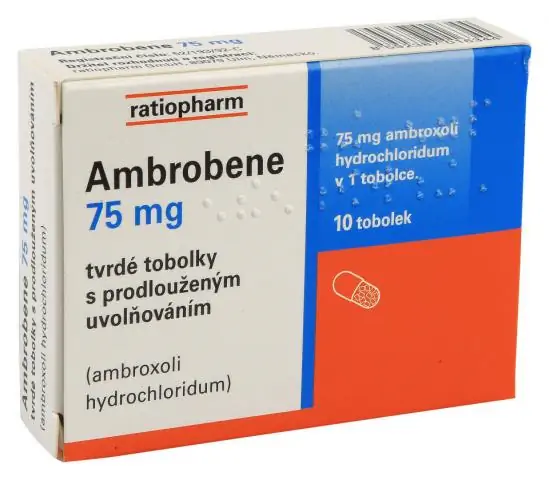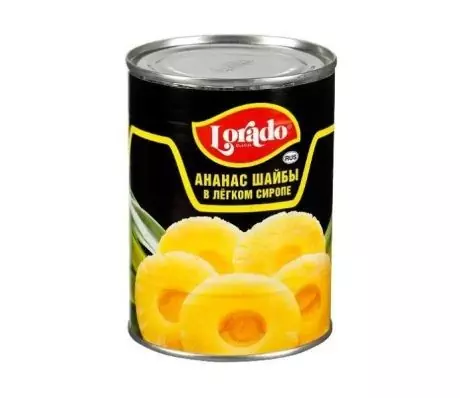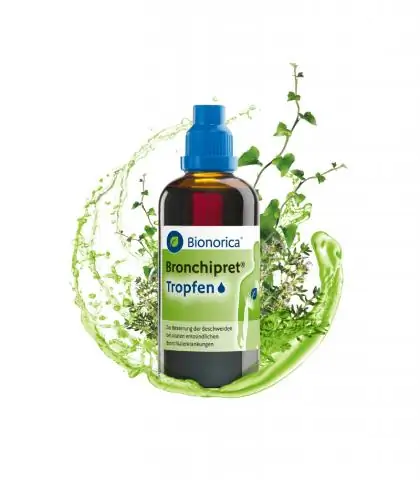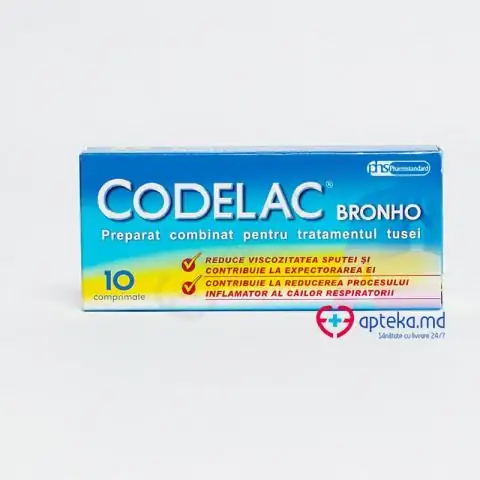- Author Rachel Wainwright wainwright@abchealthonline.com.
- Public 2023-12-15 07:39.
- Last modified 2025-11-02 20:14.
Fenspiride
Fenspiride: instructions for use and reviews
- 1. Release form and composition
- 2. Pharmacological properties
- 3. Indications for use
- 4. Contraindications
- 5. Method of application and dosage
- 6. Side effects
- 7. Overdose
- 8. Special instructions
- 9. Application during pregnancy and lactation
- 10. Use in childhood
- 11. Drug interactions
- 12. Analogs
- 13. Terms and conditions of storage
- 14. Terms of dispensing from pharmacies
- 15. Reviews
- 16. Price in pharmacies
Latin name: Fenspiride
ATX code: R03DX03
Active ingredient: fenspiride (fenspiride)
Manufacturer: Ozone, LLC (Russia); NATIVA, LLC (Russia); Pharmstandard-UfaVITA, JSC (Russia); Pharmtechnology, LLC (Republic of Belarus)
Description and photo updated: 22.11.2018

Fenspiride is a drug that has anti-inflammatory and anti-bronchoconstrictor effects.
Release form and composition
Dosage forms:
- film-coated tablets: round, biconvex, almost white or white; the core in the cross section is almost white or white (in a cardboard box 1-6 or 10 blisters of 10, 20 or 30 tablets or 1 can of 10, 20, 30, 40, 50, 60 or 100 tablets);
- syrup: transparent orange or orange with a brown tint; a precipitate may form, which disappears when the bottle is shaken (in a cardboard box 1 plastic bottle of 150 ml).
Composition of 1 tablet:
- active substance: fenspiride hydrochloride - 80 mg;
- auxiliary components: calcium hydrogen phosphate dihydrate - 118 mg; hypromellose - 106 mg; povidone K25 - 13 mg; colloidal silicon dioxide - 1 mg; magnesium stearate - 2 mg;
- shell: hypromellose - 4.7 mg; macrogol 4000 - 0.9 mg; titanium dioxide - 1.15 mg; magnesium stearate - 0.25 mg.
Composition of 1 ml of syrup:
- active substance: fenspiride hydrochloride - 2 mg;
- auxiliary components: concentrated hydrochloric acid, methyl parahydroxybenzoate, glycerin, granulated sugar, potassium sorbate, propyl parahydroxybenzoate, honey flavor, orange yellow dye E110, purified water.
Pharmacological properties
Pharmacodynamics
Fenspiride has anti-inflammatory and anti-bronchoconstrictor effects, which is associated with a decrease in the production of a number of biologically active substances [cytokines, in particular tumor necrosis factor alpha (TNF-α), derivatives of arachidonic acid, free radicals], which play an important role in the development of bronchospasm and inflammation.
The suppression of the metabolism of arachidonic acid by fenspiride is potentiated by its H 1 -antihistamine action, since histamine stimulates the formation of its products (leukotrienes and prostaglandins). In addition, the substance blocks α-adrenergic receptors, the stimulation of which proceeds with an increase in the secretion of the bronchial glands. Thanks to the use of the drug, the development of inflammation and obstruction of the bronchi is inhibited.
Fenspiride also has antispasmodic properties.
Pharmacokinetics
The absorption of fenspiride occurs relatively slowly in the gastrointestinal tract. After oral administration, the maximum concentration is reached after 6 hours.
The half-life of fenspiride is 12 hours. It is excreted mainly by the kidneys (approximately 90%).
Indications for use
- diseases of the upper and lower respiratory tract: laryngitis, rhinopharyngitis; tracheobronchitis; respiratory symptoms (in the form of cough, hoarseness, sore throat) against the background of measles, whooping cough and flu; bronchial asthma (concurrently with other drugs); bronchitis with / without chronic respiratory failure; infectious diseases of the respiratory tract, proceeding with a cough, in cases where standard antibiotic therapy is indicated;
- sinusitis and otitis media of various etiologies.
Contraindications
- pregnancy and the period of breastfeeding;
- age up to 2 years - syrup;
- age up to 18 years - tablets;
- glucose-galactose malabsorption, fructose intolerance, sucrose-isomaltase deficiency - syrup;
- the presence of individual intolerance to the components of the drug.
Instructions for the use of Fenspiride: method and dosage
Fenspiride syrup and tablets should be taken orally, preferably before meals. The syrup bottle must be shaken before taking.
Frequency rate of application - 2-3 times a day.
Adults are prescribed 1 tablet of Fenspiride, maximum - 3 tablets per day.
The recommended daily dose of the drug in the form of a syrup (1 tablespoon corresponds to 15 ml, 1 teaspoon - 5 ml):
- adults and children from 12 years old: 45-90 ml;
- children 2-12 years old: 4 mg / kg (2 ml / kg): with body weight up to 10 kg - 10-20 ml (can be added to food); more than 10 kg - 30-60 ml.
The duration of therapy is determined by the doctor.
Side effects
Most often, during the period of therapy, the development of disorders from the digestive system is noted.
Possible adverse reactions (> 10% - very often;> 1% and 0.1% and 0.01% and <0.1% - rarely; <0.01% - very rare; with an unknown frequency - in cases where based on the available data, it is impossible to establish the incidence of adverse reactions):
- nervous system: rarely - drowsiness; with an unknown frequency - dizziness;
- heart: rarely - moderate tachycardia (with a decrease in the dose of the drug, its severity decreases); with an unknown frequency - a feeling of palpitations, a decrease in blood pressure (may be associated with tachycardia);
- digestive system: often - nausea, gastrointestinal upset, epigastric pain; with an unknown frequency - vomiting, diarrhea;
- skin and subcutaneous tissues: rarely - angioedema, rash, erythema, urticaria, fixed erythema pigmentosa; with an unknown frequency - toxic epidermal necrolysis, pruritus, Stevens-Johnson syndrome;
- general disorders: with an unknown frequency - increased fatigue, asthenia.
The severity and frequency of side effects may vary depending on the dosage form of the drug.
Overdose
There are data on cases of overdose when taking Fenspiride at a dose of more than 2320 mg.
Main symptoms: agitation / drowsiness, sinus tachycardia, vomiting, nausea.
Therapy: gastric lavage, maintenance of vital body functions, monitoring of the electrocardiogram. In case of overdose, seek medical attention.
special instructions
The use of Fenspiride does not replace antibiotic therapy. Taking the drug should not be a reason to postpone the adequate prescription of drugs with antibacterial action.
The syrup contains sugar. One teaspoon of the drug contains 3000 mg of sucrose, which corresponds to 0.3 XE (bread units).
Fenspiride syrup contains parabens (propyl parahydroxybenzoate and methyl parahydroxybenzoate), which can lead to the development of allergic reactions, including delayed ones.
Influence on the ability to drive vehicles and complex mechanisms
While taking Fenspiride, patients should take into account the likelihood of developing drowsiness, especially at the beginning of the course or in combination with alcohol. Be careful when driving a motor vehicle.
Application during pregnancy and lactation
According to the instructions, Fenspiride is contraindicated during pregnancy / lactation.
Pediatric use
Fenspiride therapy is contraindicated:
- syrup - up to 2 years;
- tablets - up to 18 years old.
Drug interactions
The combined use of Fenspiride with drugs that have a sedative effect, as well as with alcohol, should be avoided, which is associated with the likelihood of an increase in the sedative effect.
Analogs
Analogs of Fenspirid are: Epistat, Erispirus, Erespal, Siresp, Eladon, Fespalen.
Terms and conditions of storage
Store in a place protected from light at temperatures up to 25 ° C. Keep out of the reach of children.
The shelf life is 3 years.
Terms of dispensing from pharmacies
Dispensed by prescription.
Reviews about Fenspiride
According to a few reviews, Fenspiride is an effective drug. In some cases, the development of adverse reactions is reported, their severity can be reduced by adjusting the dosage regimen.
The price of Fenspiride in pharmacies
The price of Fenspiride is unknown because the drug is not available in pharmacies.
Approximate price for analogs: Sirep (1 bottle 150 ml) - 155-230 rubles, Epistat (1 bottle 150 ml) 133-194 rubles, Erespal (1 bottle 150 or 250 ml) - 198-491 or 269-564 rubles … Change of medicinal product must be agreed with the doctor!

Maria Kulkes Medical journalist About the author
Education: First Moscow State Medical University named after I. M. Sechenov, specialty "General Medicine".
Information about the drug is generalized, provided for informational purposes only and does not replace the official instructions. Self-medication is hazardous to health!






